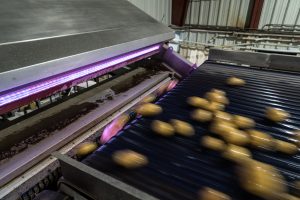By Whitton Feer – Center, Colorado
Facing depleted aquifers and a population opposed to change, farmers in the San Luis Valley must innovate and adapt in order to remain on the frontline of potato production in the US.
Rusty, a chocolate lab chased a potato through a dusty patch of Rockey Farms, retrieving it for Sheldon Rockey, a man who eats potatoes 4 nights a week and co-owns a potato farm centered in the arid San Luis Valley.

Rusty chasing potatoes within a storage building on Rockey Farms
This farm was founded in 1938 and is owned by brothers Sheldon and Brendon Rockey. Together, they have pioneered a new farming strategy that uses far less water than the traditional potato farming methods used throughout the valley.
Prior to 1998, the Rockey brothers relied on a traditional 4-year crop rotation cycle. They planted Barley on half of their 500-acre farm, and reserved the rest for potatoes. The problems arose when the barley started contaminating potatoes, said Sheldon Rockey. He and his brother found a new solution, planting a mix of seeds, lentils, buckwheat and other crops that they call green manure.
This new take on farming not only eradicated contamination, It used far less water, said Rockey, reducing their total use from 2-acre feet per year to under 1.
“We have a surplus of water,” said Rockey, who puts more water back into the aquifer than he removes.
This is extremely beneficial to the community and the water table. Conservation of water is now more important than ever, said Cleve Simpson, a lifelong barley farmer who runs the Rio Grande Water Conservation District.
“We rely on that aquifer for our wellbeing,” said Simpson
Simpson is responsible for helping organize regions of the valley into subdistricts that voluntarily tax their water use to ensure their aquifer is not depleted. These subdistricts have played a major roll in conserving water in the valley. Rockey is part of subdistrict 1, which currently charges $75 per acre-foot of water, but the price is scheduled to be raised to $150 per acre-foot in the next year.
This self-assessed charge motivates ranchers to use water responsibly, according to Simpson, who states that the districts “came together out of self preservation.” Most of the farmers understand the need to protect their water source, as the crops and pastures will suffer without it, Simpson said.
40% of the water from the Rio Grande and the connected aquifers must also make it to New Mexico, further reducing the supply for the San Luis Valley. It’s “highly over-appropriated,” said Simpson. The combination of drought and over appropriation necessitates action, like that found on Rockey Farms.
Rockey shifted his entire farming strategy to use less water, altering his cover crops and adopting green manure, but his farm is an anomaly.
Many farmers use the same farming practices that their grandparents were using, said Rockey. They are slowly adapting, but still rely on practices developed when water shortage was not a concern.
“Why change when you’ve been successful?” It’s a question Rockey repeatedly hears among farmers in his community. Aside from occasional dry years, farmers have still been able to continue their age-old practices with little consequence from nature.
The drought isn’t the primary concern for farmers, said Rockey, who said they are more concerned about repaying their debt and providing for their family, issues that are more tangible and result in more direct consequences.
The lack of concern for water is troubling, said Stephanie Chandler, a middle-aged woman in work clothes, who runs a potato packing operation in Monte Vista.

A machine sorts potatoes at the packing facility in Mosca Colorado
She stressed the importance of farming, saying that the San Luis Valley produces potatoes for much of the Western US.
“It’s far reaching here,” said Chandler.
If water became too scarce for potato farming, food shortages would affect most of the nation. “Where do we go from here?” She said, referring to a world in which the aquifer could not sustain farming.
Many farmers don’t have any other options.
“Agriculture is what keeps us alive,” said Simpson. “It’s what we do.”
“We’re gonna be farming for the next 30 years,” said Rockey, who intends to farm and throw potatoes for Rusty for as long as he can.
